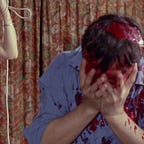Why Is Abel Gance's Napoleon So Hard To Find?
The complicated copyright web entangling a public domain film.
So, there’s a new film of Napoleon coming out next month — another bloated Hollywood epic that’s sure to disappoint a lot of people and lose a lot of money. I figured there would be no better time to finally sit down and watch French auteur Abel Gance’s 5 ½-hour epic of Napoleon from 1927. The timing is perfect, as the film just slipped into the public domain this year.
However, I went onto YouTube, and I couldn’t find any uploads of the full film anywhere. I couldn’t find it on any streaming services. After scrolling through pages of results on Google, I could find only one upload of the full film, on Vimeo.
United States copyright law states that a work shall enter the public domain 96 years after its publication, on January 1. This year, all works published in 1927 have slipped into the PD. Napoleon was released in 1927, so it should be no exception, right?
Well, if we take a look at the French copyright law, it states that a work shall enter the public domain 70 years after the death of the author. Director Abel Gance died in 1981, so that would mean the copyright on his films would be relinquished in 2051! Jesus, I thought the American copyright law was absurd.
However, that’s the French copyright law. That shouldn’t stop someone outside their jurisdiction from distributing the film themselves, no? If not on the World Wide Web, then perhaps on physical media. Right?
Well, now we have to look at the film's complicated screening history. Napoleon premiered in France in April 1927, in a cut that was just over four hours. A month later, Gance premiered his version definitive, which ran over nine hours. Afterwards, the film was severely truncated for its international release. When Metro-Goldwyn-Mayer picked up the film for its American release in 1929, they cut it down to under 2 hours. This was the same studio that had butchered Erich Von Stroheim's nine-hour cut of Greed just five years earlier.
In the decades since, there has been an ongoing effort to restore Gance's Napoleon to its original form, an effort spearheaded by one Kevin Brownlow. He had been fascinated with the film since he watched short reels of it as a child, and would spend many years working to reconstruct the film. In 1979, he premiered his 5-hour cut of the film at the Telluride Film Festival, with Gance in attendance. The following year, the reconstruction was picked up for U.S. distribution by Francis Ford Coppola and Universal Pictures. The film would be re-edited, with a new score by Coppola's father, Carmine.
Brownlow would later cut new versions of Napoleon, including a 2000 restoration featuring footage recovered from the Cinémathèque Française. There would be some legal trouble involving Coppola and Universal over whether Brownlow had the right to screen the film without Carmine Coppola's score. Apparently, Coppola and Universal own the rights to the 1980 reconstruction, and so you would need permission from them to screen any new versions of the film. I think? This is where it gets complicated.
I'm no legal expert, so take what I'm saying with a grain of salt. I've done a minimal amount of research. Technically, Napoleon is in the public domain in the United States, but the reconstructions are copyrighted. So, if you want to screen one of the versions of the film that have been released in the last 40+ years, you have to get permission from either Coppola, Universal, the British Film Institute, the Cinémathèque Française, or Netflix, who has apparently been supervising a new 7-hour reconstruction, but no new word on that since 2021.
The only way to distribute the film legally, without paying royalties, is if you somehow find one of the original prints of the film that screened in 1927. That would undoubtedly be in the public domain. However, these reconstructions, with new edits, intertitles, and music scores, are protected property.
In summation, Abel Gance's Napoleon is in the public domain (in the U.S.), and at the same time, it is not, so long as these rights holders can abuse their powers. I've also found that Gance's earlier 1923 epic La roue (The Wheel) is similarly elusive online, so I imagine a similar situation is going on with that film and its reconstructions. It just ain't right what these companies are doing with these artifacts of cinema history. They don't just belong in a museum. They belong to the public.
